A month after Mark Zuckerberg’s April 10 and 11 testimony on Capitol Hill, the chattering class seems to agree that he and Facebook dodged the political equivalent of the grim reaper. And yet the sharp scythe of history is still swinging, and Zuckerberg could still get sliced.
Yet at the same time, Zuckerberg has his own bold designs to make history cut his way, and they seem to be large, indeed — imperial, you might say (more on that later). In other words, it might be Zuckerberg who does the scything — and the slicing. And ask yourself: Over the last 15 years, who has done well by betting against him?
The Zuck Paradox
To be sure, there were some notably nasty headlines in the wake of the Facebook emperor’s appearance in Washington, DC. The Daily Beast, for example, bannered, “Zuckerberg gaslights Congress.” And yet by contrast, The Washington Post headline was a godsend to Team Facebook: “Zuckerberg apologizes, promises reform.”

Facebook CEO Mark Zuckerberg testifying before Congress on April 10, 2018. (Photo: JIM WATSON/AFP/Getty Images)
Thus we come to what might be called the Zuck Paradox: Mark Zuckerberg is striving mightily to present himself as just a regular guy—he calls himself just “Mark,” or “Zuck,” and so you can, too—who is willing to admit that he makes mistakes and so will try harder. And who doesn’t like a winsome young man who sincerely desires to change himself and do better?
Or maybe, to bring up the other half of the paradox, he’s not so sincere. Maybe the contrition thing was just a contrivance of the mighty Facebook communications team, which operates with the relentless efficiency of a Roman legion.
As the The New York Times reported prior to the Congressional hearings, “Facebook has spent the last couple of weeks trying to transform its public image from a defiant, secretive behemoth into a contrite paragon of openness.” And the company has been doing this image-transforming, the Times added, with the help of a comms team of 500 people, plus an unknown number of consultants, spin doctors, and lawyers. Then the newspaper added dryly, “Their goal is to make Mr. Zuckerberg appear as humble, agreeable and as forthright as possible.” In that vein, an observer at The Washington Post was harsh in assessing Zuckerberg’s actual testimony: “He was generally effective in clamping down on his natural arrogance.”
Still, the tech titan’s trip was a triumph. As the buzzy Beltway publication Axios put it a few days after his testimony, “Facebook survived its congressional onslaught” with only “minimal” damage. It’s true that the expedition was expensive, and that the expenses are ongoing: As Bloomberg News headlined it, “Facebook Goes on a Hiring Spree for Washington Lobbyists.” But sometimes, in the DC swamp, you get what you pay for.
Yes, all the indicators suggest that Facebook’s expenditures have been worth every last denarius. Facebook’s stock price has fully recovered from the hit it took in March, when it was revealed just how hip-deep it had sunk into Russian murk. And so Zuckerberg’s net worth is back up to a world-girdling $71 billion.
However, the hits on Facebook keep coming. As any Breitbart News reader knows, tech editor Allum Bokhari has been withering in his criticism of the company, as well as other social-media companies.
And others on the right feel the same way. On May 1, for example, Brent Bozell and 61 other conservative leaders published a joint statement blasting Silicon Valley:
Social media firms have banned gun videos and rejected pro-life advertisements. They have skewed search results and adjusted trending topics in ways that have harmed the right. Firms have restricted and deleted videos, even academic content. Conservative tech employees have found their speech limited and their careers harmed. And top tech companies have given preferential treatment to anointed legacy media outlets that also lean left. These same tech titans then work with groups openly hostile to conservatives to restrict speech.
Meanwhile, on May 10, Congressional Democrats core-dumped thousands of divisive and polarizing Facebook ads from 2015 to 2017. In covering the story, USA Today detailed just how much mayhem the Russians were trying stir up:
Many of the ads, placed by Russians posing as Americans, didn’t endorse a specific candidate but spread inflammatory messages on sensitive subjects such as immigration and race to amplify fault lines in American life, targeting users from specific backgrounds and tight races in key states such as Pennsylvania, Wisconsin and Virginia.
In other words, the Russians weren’t just attempting to disrupt or influence the 2016 election; they were attempting to disrupt or influence U.S. politics overall. And Facebook was right there with them, taking Russian money.
As an aside, while this latest bunch of ads drew enormous attention, back in March, Rep. Lamar Smith (R-TX) detailed similar ads aimed at thwarting new gas and oil pipelines, and generally disrupting US energy production. Yet that revelation was met with yawns by the mainstream media, or even with quiet approval by grateful greens.
Also on May 10, Bloomberg BusinessWeek published a disturbing report of Facebook still playing host to terrorist organizations:
At least a dozen U.S.-designated terror groups maintain a presence on Facebook . . . includ[ing] Hamas and Hezbollah in the Middle East, Boko Haram in West Africa, and the Revolutionary Armed Forces of Colombia (FARC).
Mindful of these new embarrassments, we can look ahead and see that Zuckerberg, aided by his p.r. legions, will likely be doing even more apologizing.
Of course, not everyone will buy it. Last month, The New Yorker sniped, “Mark Zuckerberg has spent most of his adult life apologizing, but he hasn’t managed to improve much.” Thus, the magazine concluded, Zuckerberg’s sorrowfulness “rings so hollow.”
Quo Vadis, Mark Zuckerberg?
In the New Testament Apocrypha, the Latin phrase Quo Vadis (where are you going?) refers to the Apostle Peter’s first century encounter with the Risen Christ outside of Imperial Rome. So now, today, we might ask: Where are you going, Mark Zuckerberg?
And also, perhaps even more immediately, Who is the real Mark Zuckerberg? Is he really the multi-billionaire 34-year-old (as of May 14) CEO so restyled, so full of apologetics, that we saw last month on live TV?
Or, perchance, is the real Zuckerberg still the same as when he was the 19-year-old co-founder of a college start-up? On February 4, 2004, that Zuckerberg, the driving force behind what was then called “The Facebook,” instant-messaged one of his buddies, mocking those who had trusted him with their information as “dumb [bleeps]” whom he would “[bleep] in the ear.”
So which is it now: The New Zuckerberg, or the Original Zuckerberg?
Although many people change as they grow older, the evidence suggests, in this case, that the Original Zuckerberg has survived, even as his company has thrived.
For instance, Roger McNamee, a prominent Silicon Valley venture capitalist and an early investor in Facebook, has since become an unsparing critic of the company, labeling it “parasitic.” Noting Facebook’s internal catchphrase, “Move fast and break things,” McNamee observes that those words make for “a pretty sociopathic motto.”
Yet for the most part, for the last decade-and-a-half, Facebook has sailed along; it has had the money, mystique, and momentum to generate its own reality distortion field. Most notably, Zuckerberg himself has been the distortion-fielder-in-chief; he is given to delivering utopian one-world pronouncements, in praise of planetary interconnectedness. In particular, his annual messages—you know the same kind of homily that the Pope and the Queen of England deliver in the New Year—are celebrations of what might be called the Zuckervision. On January 11, for example, he held forth with still more corporate-utopian happy talk:
We built Facebook to help people stay connected and bring us closer together with the people that matter to us. That’s why we’ve always put friends and family at the core of the experience. Research shows that strengthening our relationships improves our well-being and happiness.
Indeed, as recently as May 1, Zuckerberg was still sounding the same theme:
I believe that we need to design technology to help bring people closer together. And I believe that that’s not going to happen on its own. So to do that, part of the solution, just part of it, is that one day more of our technology is going to need to focus on people and our relationships. [Emphasis added]
We might pause over those words, “not going to happen on its own.” In other words, Facebook will do something for us, or to us—whether we want them to or not.
Highlighting this passage, the Stratechery blog zeroed in on this “messianic fervor”:
Zuckerberg, as so often seems to be the case with Facebook, comes across as a somewhat more fervent and definitely more creepy version of Google: not only does Facebook want to do things for you, it wants to do things its chief executive explicitly says would not be done otherwise.
So maybe Zuckerberg wants to do more than help us get closer to each other. One chronicler who thinks so is Kate Losse, who worked as Zuckerberg’s speechwriter and blog writer from 2009 to 2011. As Losse recalled in April, Zuckerberg liked to declare that his goal was “domination!” Moreover, to him, it was “companies over countries.” As Losse writes, “The idea of ‘domination’ seemed as much a half-serious, half-joking fantasy as a hard-set mission,” and yet over time, “the idea of domination started to become plausible.”
That creepy vignette alone would seem to indicate that Facebook in 2018 still reflects the values of its founding in 2004.
Mark Zuckerberg, Meet Victor Frankenstein—and Hail, Augustus Caesar!
In Part One of this series, we began considering the phenomena of the “New Frankensteins.” Of course, in using the word “Frankenstein,” Virgil was referring not to the monster of popular imagination—that monster wasn’t named Frankenstein—but was recalling Victor Frankenstein, the creator of the monster in Mary Shelley’s 1818 novel, Frankenstein; or, the New Prometheus. In that classic work, Dr. Frankenstein is not a bad person, in the sense of planning to do evil. He possessed, as a defense attorney might say on his behalf, using the Latin-legal phraseology, no mens rea—no criminal intent.
But the key point to remember is that Frankenstein was sorry—truly sorry. After his monster runs amok, he is found at the North Pole—literally, running around on the ice floes—trying to chase down his monstrous creation. And in fact, Frankenstein dies from exhaustion and exposure in his effort.
In other words, through the sacrifice of his own life, Frankenstein redeemed himself, at least somewhat. Yes, his name is forever synonymous with hubristic overreach, but he himself proved to be a good guy in the end, because shortly after he dies, the monster dies, too. So now we might ask: Will Zuckerberg ever make any sort of heroic effort to undo the damage he has done?
Okay, so now let’s ask: What would the fictional Victor Frankenstein say about the non-fictional Mark Zuckerberg? Frankenstein might think that he, Victor, had been sincere in his original impulse; that is, in starting his lab work, he had truly been wanting to help people. Yet by contrast, Frankenstein might not think that Zuckerberg started Facebook with the intention of helping anyone but himself. Nor is it clear that Zuckerberg regrets anything other than getting caught with his hand in our privacy cookie jar.
On the other hand, as with Frankenstein, Zuckerberg seems also to have an idealistic side. Back in 2015, he pledged to give away 99 percent of his fortune to charity. Specifically, with his wife Priscilla Chan, he has launched the Chan-Zuckerberg Initiative, which focuses on new medical cures; that’s about as meritorious a philanthropic endeavor as anyone could think of.
Yet perhaps the most remarkable thing about Zuckerberg is that everything that we know about him has happened in the first 34 years of his life. So what might his next 34 years bring? Or the 34 years after that? (Let’s remember, Zuckerberg has chosen to focus his giving on medicine; he has said that his goal is to see the average human lifespan stretched to 100 years—and who knows what longevity he has in mind for himself.)
As for Virgil, in his own long existence—admittedly, in less ritzy places than Zuckerberg enjoys—this scribe has learned never to accept automatically the optimistic scenario about someone’s life But he’s also learned never to accept automatically the pessimistic scenario about someone’s life. Instead, good Roman that he is,Virgil puts great stock in the mysteries of fate and destiny, which can be known by mere mortals only dimly.
And so Virgil has been intrigued by the persistent meme that Zuckerberg thinks of himself as a latter-day Roman, maybe even a Roman emperor. As Zuckerberg himself said in 2016, “I love Rome. I studied Latin and Roman history and culture. I loved it so much that when I was going to college, I actually thought I was going to major in Classics.” And in that same appearance, he added,
I love Rome so much, that when my wife and I got married, we came to Rome on our honeymoon. I made us go to all of these different historical and classical places. So much so, that when we got back and we were looking through the photos, my wife was making fun of me, saying she thought there were three people on the honeymoon: me, her and Augustus. All the photos were different sculptures of Augustus.
And, of course, he has that Augustus Caesar-style haircut. Indeed, he gave his daughters distinctly Roman-sounding names, Maxima and August.
So Virgil figures that Zuckerberg has more in mind for himself than just being remembered as the guy who created the world’s richest social network. In fact, perhaps Zuckerberg has the sort of ambition found in The Aeneid, Virgil’s epic poem about the founding of the Roman Empire—a poem commissioned, by the way, by that same Augustus Caesar. In that work, the hero, Aeneas, seeking divine inspiration for his task, begs a goddess to fill his soul “with thy celestial fire.”
Will Zuckerberg’s soul ever be filled celestial fire? And if so, will that be a good thing or a bad thing? We’ll have to see. The only thing we know for sure is that Zuckerberg’s recent journey to the Capitoline Hill—oops, to Capitol Hill—did nothing to stop his planned triumphal progression.





COMMENTS
Please let us know if you're having issues with commenting.